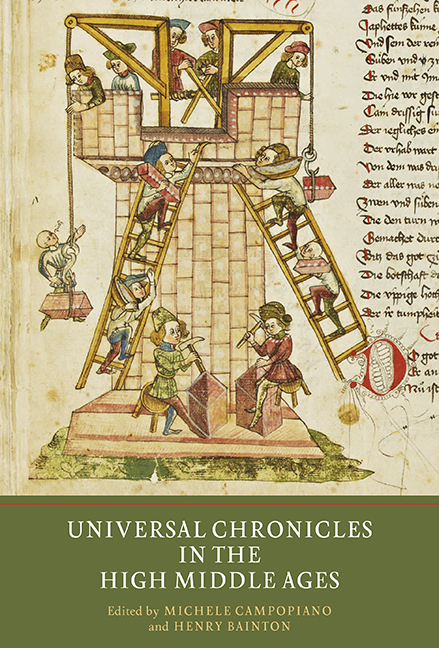Book contents
- Frontmatter
- Contents
- List of Illustrations
- Dedication
- Contributors
- Introduction: New Perspectives on Universal Chronicles in the High Middle Ages
- 1 The First Islamic Chronicle: The Chronicle Of Khalīfa B. Khayyāṭ (d. AD 854)
- 2 Universal Historiography as Process? Shaping Monastic Memories in the Eleventh-Century Chronicle Of Saint-Vaast
- 3 Writing Universal History in Eleventh-Century England: Cotton Tiberius B. i, German Imperial History-writing and Vernacular Lay Literacy
- 4 Political Didacticism in the Twelfth Century: the Middle-High German Kaiserchronik
- 5 Cosmology, Theology of History and Ideology in Godfrey of Viterbo's Pantheon
- 6 Écrire l'histoire universelle à la cour de Konrad IV de Hohenstaufen : la Weltchronik de Rudolf von Ems (milieu du XIIIe siècle)
- 7 Écrire la première histoire universelle en français: l'Histoire ancienne jusqu’à César de Wauchier de Denain et l'adaptation du modèle latin de l'histoire universelle à un public de laïcs
- 8 How Unusual was Matthew Paris? The Writing of Universal History in Angevin England
- 9 The Pillars of Hercules: The Estoria De Espanna (Escorial, Y.I.2) as Universal Chronicle
- 10 La vie d'Alexandre dans la Chronique dite de Baudouin d'Avesnes
- 11 Universal Histories and their Geographies: Navigating the Maps and Texts of Higden's Polychronicon
- Index
- Writing History in the Middle Ages
3 - Writing Universal History in Eleventh-Century England: Cotton Tiberius B. i, German Imperial History-writing and Vernacular Lay Literacy
Published online by Cambridge University Press: 23 June 2018
- Frontmatter
- Contents
- List of Illustrations
- Dedication
- Contributors
- Introduction: New Perspectives on Universal Chronicles in the High Middle Ages
- 1 The First Islamic Chronicle: The Chronicle Of Khalīfa B. Khayyāṭ (d. AD 854)
- 2 Universal Historiography as Process? Shaping Monastic Memories in the Eleventh-Century Chronicle Of Saint-Vaast
- 3 Writing Universal History in Eleventh-Century England: Cotton Tiberius B. i, German Imperial History-writing and Vernacular Lay Literacy
- 4 Political Didacticism in the Twelfth Century: the Middle-High German Kaiserchronik
- 5 Cosmology, Theology of History and Ideology in Godfrey of Viterbo's Pantheon
- 6 Écrire l'histoire universelle à la cour de Konrad IV de Hohenstaufen : la Weltchronik de Rudolf von Ems (milieu du XIIIe siècle)
- 7 Écrire la première histoire universelle en français: l'Histoire ancienne jusqu’à César de Wauchier de Denain et l'adaptation du modèle latin de l'histoire universelle à un public de laïcs
- 8 How Unusual was Matthew Paris? The Writing of Universal History in Angevin England
- 9 The Pillars of Hercules: The Estoria De Espanna (Escorial, Y.I.2) as Universal Chronicle
- 10 La vie d'Alexandre dans la Chronique dite de Baudouin d'Avesnes
- 11 Universal Histories and their Geographies: Navigating the Maps and Texts of Higden's Polychronicon
- Index
- Writing History in the Middle Ages
Summary
London, British Library, Cotton Tiberius B. i contains an early eleventh century copy of the Old English Orosius (fols. 3r–111v) which was joined, c. 1045, with the C version of the Anglo-Saxon Chronicle (ASC) (fols. 115v–164r). The C Chronicle is prefaced by two Old English poems known as the Menologium (fols. 112r–114v), a calendar poem and Maxims II (fols. 115r–115v), a collection of precepts offering proverbial wisdom. The aim of this chapter is to open up the political and intellectual impetuses behind this mid eleventh century act of compilation. Katherine O'Brien O'Keeffe, the most recent editor of C, incisively characterized the product of this compiling as ‘a book of histories’. Tiberius B. i, although produced in England and in the vernacular, will emerge as poised on the cutting edge of wider developments in eleventhand twelfth-century European historiography – and in particular in relation to developments in universal history, which we more readily associate with Latin history-writers of the German Empire.
The methodology of this chapter entails the tight integration of codicological and textual analysis with evidence of the political and intellectual engagements of the compiler of Tiberius B. i to argue that the additions of poetry and chronicle to the Orosius c. 1045 produced a coherent and unified text. I will build on Stephen Baxter's persuasive study of how ASC C promoted the interests of Earl Leofric of Mercia and his family amidst the bitter factionalism of the mid eleventh century to consider very precisely how the whole Orosius–poetry–ASC compilation, and not just C, aimed to intervene directly in politics on behalf of Leofric in the specific context of the Anglo-Saxon court of the mid 1040s. That innovative and intellectually demanding history-writing, such as Tiberius B. i's creation of a vernacular universal chronicle, was an active and effective political discourse has much to tell us about pre-Conquest English literary culture and its place within a wider European context.
Within that wider European context, Tiberius B. i does not lose relevance as a result of its vernacularity. Set alongside contemporary German Imperial texts, it brings insight into the relationship of universal chronicles to the politics of empire and the place of compilation in the writing of history.
- Type
- Chapter
- Information
- Universal Chronicles in the High Middle Ages , pp. 65 - 94Publisher: Boydell & BrewerPrint publication year: 2017
- 3
- Cited by

